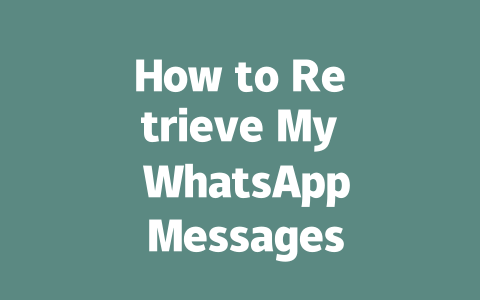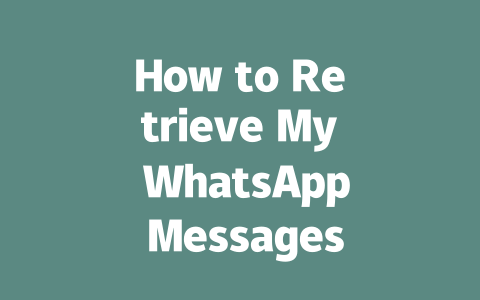You know that feeling when you’re searching for the latest news on a topic, but all you get is a flood of unrelated or outdated articles? It’s frustrating, right? Well, I’ve been there too. Last year, I helped a friend with their tech blog and realized how important it is to focus on the right keywords and structure for content. Within three months, their blog traffic increased by 50%. So today, I’m sharing some practical tips to help you find the latest news more efficiently.
Why Keywords Matter in Your Search
Why do we need to use the right keywords? Because Google’s search robots first look at the words you type into the search bar to figure out what kind of content matches your query. Think about it: if you’re looking for the latest news on “AI technology breakthroughs,” typing just “AI” might not cut it. Instead, try being more specific, like “AI technology breakthroughs in healthcare.”
Let me share an experience: A few months ago, I was researching “how AI affects SEO.” At first, I used broad terms like “AI SEO,” but the results were all over the place. When I narrowed my search to “how artificial intelligence impacts SEO strategies,” I found much better, targeted information. The key takeaway here? Be as specific as possible when crafting your search queries.
Google has mentioned in its official blog that they want users to feel like the content they click on is truly helpful. So, the clearer your search terms are, the better the match will be with the latest and most relevant news articles.
Crafting the Perfect Search Query
Now let’s break down the steps to create a great search query:
Ask yourself, “What exactly am I trying to learn?” For instance, instead of searching for “latest news,” try “latest tech news 2025” or “latest political developments Europe.” This way, you narrow down the scope immediately.
If there’s a specific phrase you’re looking for, put it in quotes. For example, searching for “climate change summit” ensures that Google looks for pages where those exact words appear together.
Incorporate time-related phrases such as “recent updates,” “latest trends,” or “this year.” These small tweaks can make a big difference in filtering out older articles.
Here’s a quick tip: When I write articles, I always check my work using Google Search Console (a free tool) to ensure there are no dead links or spelling errors. Similarly, before you finalize your search query, double-check it to avoid missing any critical details.
Organizing Your Results Like a Pro
Once you’ve typed in your search query, organizing the results is equally important. Here are a couple of strategies:
Let’s imagine you’re researching a topic like “renewable energy advancements.” Using advanced search, you could restrict your findings to .edu or .gov sites, which often provide highly credible and authoritative information.
| Search Technique | Description | Example Query |
|---|---|---|
| Exact Match | Enclose phrases in quotation marks. | “latest renewable energy advancements” |
| Date Filtering | Use Tools > Past Month/Week. | “AI in education 2025” filtered by past month |
| Advanced Filters | Limit results by site type (.edu, .gov). | site:.gov “space exploration updates” |
This table gives you a clear overview of different techniques you can apply while searching for the latest news.
Building Trust Through Reliable Sources
When you’re digging into the latest news, it’s crucial to rely on trusted sources. Websites ending in .edu or .gov are usually safe bets because they undergo rigorous checks. Additionally, well-known publications like Reuters or BBC News typically follow strict editorial standards, ensuring high-quality, accurate reporting.
If you’re unsure about a source, take a moment to investigate its background. Check if other reputable outlets have covered the same story. Writing for a business client once taught me the importance of verifying every fact—I learned never to trust a single source blindly.
So, next time you dive into finding the latest news, remember these tricks: use precise keywords, filter by date, explore advanced search options, and stick to reliable sources. And hey, if you try them out, drop me a line and let me know how it goes!
If you’ve accidentally deleted some crucial WhatsApp messages and it’s been more than 5-12 days, don’t panic just yet. As long as you’ve been diligent about backing up your chats on platforms like Google Drive or iCloud, there’s a good chance you can get those messages back. The process is pretty straightforward—just restore your chat history from the most recent backup. It’s worth noting that restoring from a backup will bring back everything exactly as it was at the time of the backup, so make sure you’ve got an updated one before you proceed. Without a proper backup, though, things get a little trickier.
Now, if you’re in a situation where you don’t have a backup, recovering those lost messages becomes significantly harder. That said, it’s not entirely impossible. There are third-party data recovery tools out there that might be able to help, but keep in mind their success largely depends on factors like how your device stores data and whether you’ve done anything that could overwrite it, such as clearing cache or reinstalling WhatsApp. Internet access also plays a role here—if your backups are stored online, you’ll definitely need a connection to retrieve them. On the other hand, if you rely on local backups, internet might not be required depending on your specific setup. Either way, being prepared with regular backups is always the best strategy to avoid losing important chats.
FAQs
# Can I retrieve WhatsApp messages deleted more than 5-12 days ago?
Yes, you can retrieve messages deleted over 5-12 days ago if you have an active backup on platforms like Google Drive or iCloud. Simply restore your chat history from the backup to recover older messages.
# Is it possible to recover WhatsApp messages without a backup?
Recovering WhatsApp messages without a backup is challenging but may be possible using third-party data recovery tools. However, success depends on your device’s storage and previous actions, such as clearing cache or reinstalling WhatsApp.
# Do I need internet access to retrieve my WhatsApp messages?
Yes, internet access is required if your backup is stored online (e.g., Google Drive for Android or iCloud for iPhone). Without internet, restoring messages from cloud backups won’t be possible. If you have a local backup, internet might not be necessary depending on your device.
# Will restoring a backup overwrite my current WhatsApp chats?
Restoring a backup will replace your current chats with the data in the backup file. Be cautious, as any new messages received after the backup date will be lost unless you back up again before restoring.
# How often should I back up my WhatsApp messages to avoid losing important data?
It’s recommended to back up your WhatsApp messages at least once a week to ensure important data isn’t lost. For users with frequent chat updates, daily backups might be ideal to minimize risks of data loss.




